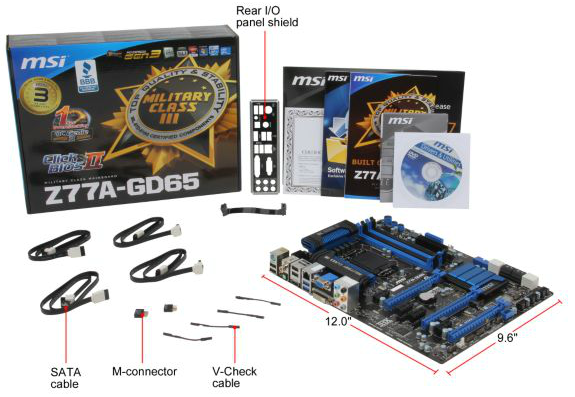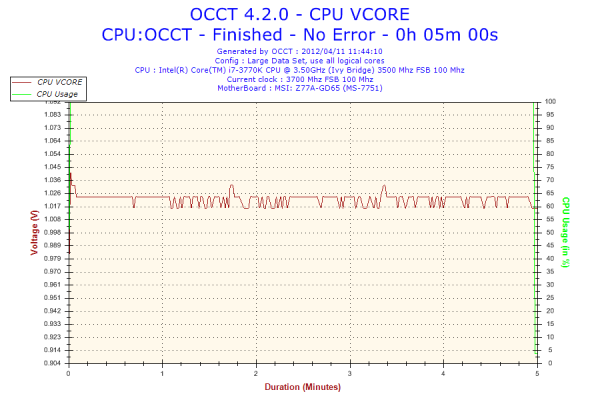Intel Z77 Motherboard Review with Ivy Bridge - ASRock, ASUS, Gigabyte, and MSI
by Ian Cutress on May 7, 2012 7:40 PM EST- Posted in
- Motherboards
- MSI
- Gigabyte
- ASRock
- Asus
- Ivy Bridge
- Z77
MSI Z77A-GD65 - In The Box
The MSI Z77A-GD65 is currently available for $190, just north of the Gigabyte board. With this in mind, we also get a few more extras in the box than the Gigabyte:
IO Shield
Driver CD
User Manual
Certification of Military Class testing (FWIW)
Four SATA cables
Flexi-SLI bridge
M-Connectors (to help front panel connections)
V-Check cables (to help with voltage read points)

Voltage Readings
Using OCCT we monitor the voltage change of the motherboard under load. This represents the direct correlation between the Load Line Calibration and how the processor/motherboard deals with voltage requests while under load. This is not to be confused with the quality of power delivery, but more an indication of how aggressive the default LLC settings are on a motherboard.
Similarly to the ASUS board in this review, the MSI has minor variations in the CPU voltage. Worthy of note though is the lower VCore used by the MSI board compared to the other boards in this review while at load, suggesting more aggressive LLC settings.
Overclocking
Note: Ivy Bridge does not overclock like Sandy Bridge. For a detailed report on the effect of voltage on Ivy Bridge (and thus temperatures and power draw), please read Undervolting and Overclocking on Ivy Bridge.
Overclocking options on the MSI Z77A-GD65 are relatively straightforward. With the OC Genie button on board, give it a press and it lights up, causing the next boot to initialize a series of predefined settings for an overclock. Manual overclocks can be done by the Click BIOS software in the operating system, or by adjusting the BIOS directly.
Automatic Overclocking: After pressing the OC Genie button, it essentially seemed to enable the Enhanced Turbo option in the BIOS. The system booted without issue, and I was greeted with a 39x multiplier under all loads, showing 1.080 volts and 65ºC with PovRay. This is a rather disappointing automatic overclock. This is also indicative of issues relating to one button overclocks - the manufacturer is supplying a series of presets that has to work on every processor out of the factory. It is perhaps time that MSI introduces their own stress-testing overclock into the mix to get a better result.
Manual Overclock: Given the previous overclocking results achieved, with the MSI board we jumped straight in with 1.2 volts, with PLL Overvoltage enabled just for good measure. At this voltage, 46x multiplier was the highest multiplier stable, giving 82ºC with PovRay and showing 1.184 volts at load. In order to get the 47x multiplier to work, it required 1.250 volts on the CPU, although this gave 90ºC during PovRay and 1.240 volts at load.











117 Comments
View All Comments
Paapaa125 - Tuesday, May 8, 2012 - link
Article: "With a lot more controllers to initialise on board, the ASUS P8Z77-V Pro requires at default 20.47 seconds to reach the windows loading screen. By disabling controllers that aren't used, a time more like the ASRock could be achieved."Did you actually test this?
And a suggestion: please test Intel DZ77BH-55K motherboard. It is the only board besides MSI to use the better ACL898 and Intel LAN chip but without other useless bulk (like secondary LAN etc). It seems to have superior BIOS to many others.
IanCutress - Tuesday, May 8, 2012 - link
Hi Paapaa125,I should have an Intel Z77 board inbound to test. I have about 5 others to test as well, and some ITX. Currently reviewing boards in my spare time, so please bear with me as I get through them all! :)
Ian
Paapaa125 - Wednesday, May 9, 2012 - link
Great to hear that! And no need to rush, I can wait :) I hope you test these things:Boot time. Fan control settings. Power consumption. Lan speed/CPU util. Audio quality. And check if the Turbo Boost settings actually are identical. Otherwise the benchmark results are unbiased.
I'm actually more interested in other features than pure computational speed and benchmark scores. The differences are usually insignificant, but the differences in other areas might be big.
althaz - Wednesday, May 9, 2012 - link
Somebody further down the thread posted a message that they configured their Asus 'board to POST much quicker than above.I second request for Intel board reviews! I am particularly interested in the DZ77GA70K as well as the 55K mentioned by Paapaa125. I've been hearing good things about the GA70K but I'm hesitant to commit without finding out about POST times and I'd also like to see if performance is the same between the 55K and 70K.
Shadowmaster625 - Tuesday, May 8, 2012 - link
Can you give us realistic power supply measurements? I am interested in building a fairly fast system that is pretty much always on. So the idle power needs to be as low as possible. I would use a smaller power supply that is at least 85% efficient @ 50 Watts. And no video card. With just one SSD and one optical drive. My best napkin-guess would be an idle power of 40-45 watts.Silenus - Tuesday, May 8, 2012 - link
That's a fair guess for idle. The problem you will have is that ideally you will want a high efficiency supply that at idle is at least 20% loaded. For you 40-45 idle that means you would need a supply probably not more than 200 watts. It is hard to find a 80+ supply at those lower powers. You might consider a small form factor supply. This is just about fits your requirement:http://www.neweggbusiness.com/Product/Product.aspx...
Shadowmaster625 - Tuesday, May 8, 2012 - link
That might be a good choice. I wonder if I would still be able to hit 4.3GHz with that supply. I would definitely keep it at stock volts.haakon_k - Tuesday, May 8, 2012 - link
..or try the 80+ gold alternative from seasonic, if you can find a shop that sells it, 300 or 350W - optionally modular.http://www.seasonic.com/product/pc_tfx.jsp
Unfortunately without any PCIe 6 pin power connector, if you so should get tempted...
Avalon - Tuesday, May 8, 2012 - link
Well that review went as expected. MSI underperformed, Asus was needlessly expensive, Gigabyte had memory issues, and Asrock OC'd with lower voltages. That;s mirrored my experiences in the past few years.goldie.lin - Tuesday, May 8, 2012 - link
Thanks for the nice benchmarks, USB, SATA, LAN, Power Consumption, ...Especially, I appreciate the "DPC Latency" and "Boot Times" tests.
It very useful and practical!!!
Keep working, AnandTech.